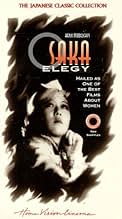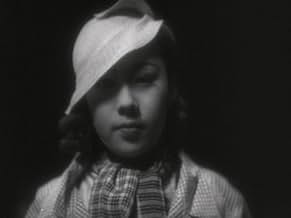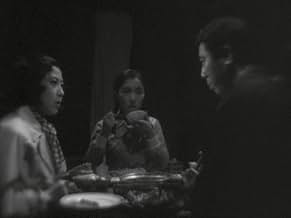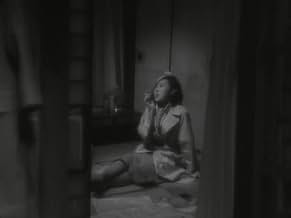NOTE IMDb
7,2/10
2,7 k
MA NOTE
Une jeune femme devient la maîtresse de son patron pour pouvoir subvenir aux besoins de sa famille.Une jeune femme devient la maîtresse de son patron pour pouvoir subvenir aux besoins de sa famille.Une jeune femme devient la maîtresse de son patron pour pouvoir subvenir aux besoins de sa famille.
- Réalisation
- Scénario
- Casting principal
Avis à la une
This is the first collaboration between Mizoguchi and writer Yoshikata Yoda, with the actress Isuzu Yamada in the principal role, as a young telephonist pushed to prostitution to save her ruined family, and then repudiated by them. Mizoguchi begins his impressive mastership with the framing and the perspective and, though still far from his masterpieces, is an interesting milestone for the Mizoguchi admirers.
...with a plot out of Precode Hollywood and frequent jazz music to match. A pretty young switchboard operator reluctantly decides to become the mistress of her boss so she can help her financially-strapped father who had embezzled company funds for an investment that went bad, and her college-student brother who needs his tuition paid. Of course she is ostracized from the family for her immorality without giving her the chance to explain how they got their money. Various other relationships and subplots also come into play. This one has nicely-plotted character dynamics, good performances, and beautiful cinematography.
"Osaka Elegy" (Japanese, 1936): Directed by Kenji Mizoguchi. This is one of his earliest films. Japan was in the throes of a cultural turmoil. They were busy invading China, and feeling the schizophrenia of traditional vs modern society. This story is about a decent young woman, who, when familial pressure is applied, does anything necessary to pay the bills of a pathetic father, a self-centered brother, and a confused, naïve sister, and, a keep an abusive boss "happy". As we might expect (now), her road darkens as everyone demands more and more, gives back less and less, and shuns her for doing what they suggested and made their advantage. Expect a noir-ish look to the film, with spare traditional home sets and costuming, contrasted with high style business/commercial sets and costuming.
Ayako (Isuzu Yamada) becomes the mistress of her boss, Mr. Asai, so she can pay her father's debt, and prevent him from going to prison for embezzlement. She also sends money to her brother Hiroshi to pay his university tuition, but her father intercepts it.
Mizoguchi considered the film his first serious effort as a director, and while I am not familiar with his earlier work, I have to say this is the kind of film that leaves a mark. Either Mizoguchi or his cinematographer had an excellent awareness of the camera -- the door closing to block the camera early on in the film -- years ahead of its time.
The subject matter in general is impressive. I am not sure what the typical morality was in pre-war Japan, but to feature adultery and whatnot in the 1930s seems quite bold.
Mizoguchi considered the film his first serious effort as a director, and while I am not familiar with his earlier work, I have to say this is the kind of film that leaves a mark. Either Mizoguchi or his cinematographer had an excellent awareness of the camera -- the door closing to block the camera early on in the film -- years ahead of its time.
The subject matter in general is impressive. I am not sure what the typical morality was in pre-war Japan, but to feature adultery and whatnot in the 1930s seems quite bold.
There are so many interesting things going on in this film, and several of them surprised me. I loved Ayake (played by Isuzu Yamada) and the voices of the women in general. I couldn't help but contrast Ayake's headstrong will and fierceness to Yasujiro Ozu's Noriko in Tokyo Story (played by Setsuko Hara). Noriko was the perfect picture of traditional grace and dedication in a Japanese woman and she fit in perfectly with Ozu's straight lines and symmetrical framing. Ayake, on the other hand, is shadowed by an almost conspiratorial camera which cleverly spies on the fore and background simultaneously, and creeps behind walls and curtains to follow the characters and listen in on their conversations, amplifying the sense of daring and defiance of Ayake's character. The inventiveness of so many varying shots stole my attention more than anything else, though I also appreciated the quick and steady pacing of the story as it unfolded, predominantly led by Ayake.
http://funkyforestfirstcontact.wordpress.com/i-just-saw/
http://funkyforestfirstcontact.wordpress.com/i-just-saw/
Le saviez-vous
- Citations
Junzo Murai: You're a woman... Being taken to the police station... Getting thrown into jail... You've done shameful things. You ungrateful child!
Ayako Murai: How could you say that? I never expected that I'd be treated like this when I came home. This is ridiculous! I thought you would welcome me with open arms. If I'd have known this, I never would have come back.
- ConnexionsFeatured in Century of Cinema: Un siècle de cinéma japonais, par Nagisa Oshima (1995)
Meilleurs choix
Connectez-vous pour évaluer et suivre la liste de favoris afin de recevoir des recommandations personnalisées
- How long is Osaka Elegy?Alimenté par Alexa
Détails
- Durée
- 1h 11min(71 min)
- Couleur
- Mixage
- Rapport de forme
- 1.37 : 1
Contribuer à cette page
Suggérer une modification ou ajouter du contenu manquant













